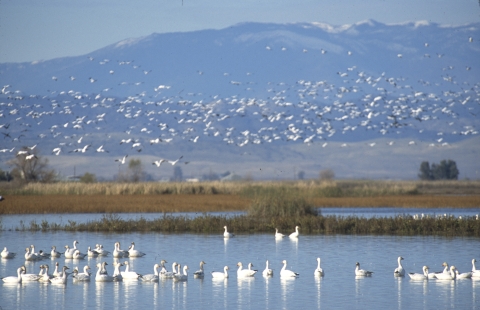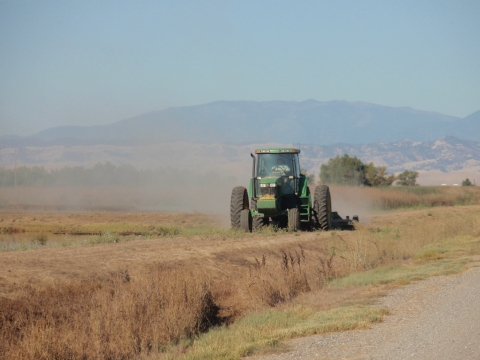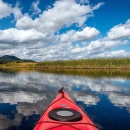Sacramento National Wildlife Refuge Complex Visitor Center Re-Opening!
The Friends of Sacramento National Wildlife Refuge cordially invite you to the Grand Re-Opening of the Visitor Center! Come explore the newly renovated facilities, learn about local wildlife, and enjoy refreshments and activities for the whole family.
Saturday, March 7, 2026 from 9AM-3PM, with a ribbon cutting at 10AM.
Sacramento NWR Complex Visitor Center: 752 County Road 99W, Willows, CA 95988
Updates are posted here as new information is received. If 'last-updated' timestamp is a few days old, it is because conditions have NOT changed since that time. Last updated 2/19/2026 8:15am*
TEMPORARILY CLOSED:
OPEN**:
- Sacramento NWR Visitor Center and Nature Store = Limited days and hours
- Sacramento NWR Auto Tour + Observation Platforms, Trails
- Sacramento NWR Logan Creek Spring Trails (seasonal: open February 15-June 30)
- Colusa NWR Auto Tour
- Colusa NWR Trail, Observation Platform
- Llano Seco Unit of Steve Thompson NCV WMA – Trail, Observation Platform
- Sacramento River NWR
*Before calling the refuge for updates, please review this section of our website or our social media pages. Any new information will be posted here and to our Facebook and Instagram promptly.
**Areas are subject to closure without notice. Please use extreme caution when driving the refuges, as flooding can occur without warning and road shoulders are soft and will not support your vehicle.
Bald Eagle Nest - Sacramento NWR
A young bald eagle pair is nesting at Sacramento NWR. To help them thrive, please stay in your vehicle and on designated roads. There’s a great alternative viewing area at the bench at Trail Marker 2 on the Wetland Walk Trail. Our Visitor Services team is available on Fridays and Saturdays (subject to change) if you need assistance during your visit. We will continue to monitor the situation and provide updates as needed. Thank you for enjoying wildlife responsibly.
Visit Us
Welcome to Delevan National Wildlife Refuge!
Delevan NWR is only open to the public for hunting and for photography-blind access (by reservation only).
There are LOTS of recreational opportunities across the Complex, including a Visitor Center, Auto Tours, trails, bicycling, photography, hunting and environmental education.
Delevan National Wildlife is one of the 5 National Wildlife Refuges and 3 Wildlife Management Areas that make up the Sacramento National Wildlife Refuge Complex:
- Sacramento NWR
- Delevan NWR
- Colusa NWR
- Sutter NWR
- Sacramento River NWR
- Llano Seco Unit (STNCV WMA)
- Butte Sink WMA
- Willow Creek-Lurline WMA
Use the table (below), the left menu (computer), or the top right hamburger menu (three lines on mobile device) to navigate to the information that's most helpful for you:
Check out our VISIT US! page = a one-stop place for all your visiting questions, including: | ||
|---|---|---|
| Activities | Information | Directions |
| ||
Location and Contact Information
About Us
Delevan National Wildlife Refuge is part of the Sacramento National Wildlife Refuge Complex. It is situated about 80 miles north of Sacramento and four miles east of the town of Maxwell in Colusa County. The refuge consists of 5,877 acres consisting primarily of wetlands with some riparian riparian
Definition of riparian habitat or riparian areas.
Learn more about riparian and grassland habitats.
Click on the link below to learn more about us!
What We Do
- Resource Management
To help plants and wildlife, Refuge staff uses a variety of habitat management techniques to maintain, recover or enhance plant and wildlife values. Refuge staff carefully consider any management techniques and employ them in varying degrees according to the situation.
- Conservation and Partnerships
The Complex is involved in many conservation endeavors, including Comprehensive Conservation Plans, Private Landowner Programs, and the National Wildlife Refuge System Improvement Act.
Click on the link below to learn more about what we do!
Our Organization
National Wildlife Refuge System Improvement Act of 1997:The NWRS Improvement Act defines a unifying mission for all refuges, including a process for determining compatible uses on refuges, and requiring that each refuge be managed according to a CCP. The NWRS Improvement Act expressly states that wildlife conservation is the priority of System lands and that the Secretary shall ensure that the biological integrity, diversity, and environmental health of refuge lands are maintained. Each refuge must be managed to fulfill the specific purposes for which the refuge was established and the System mission. The first priority of each refuge is to conserve, manage, and if needed, restore fish and wildlife populations and habitats according to its purpose.
Our Species
Delevan National Wildlife Refuge is best known for migratory waterfowl. Waterfowl are present September through April and numbers regularly peak at over 300,000 ducks and 100,000 geese. The refuge supports one of the largest known populations of palmate-bracted birds-beak (Federally listed endangered plant species) and significant breeding colonies of tricolored blackbirds. Delevan is also an important wintering grounds for Tule Greater White-fronted Geese.
Click on the link below to learn more about our Seasons of Wildlife, Wildlife Checklist, Wildlife Surveys, and Our Species....




